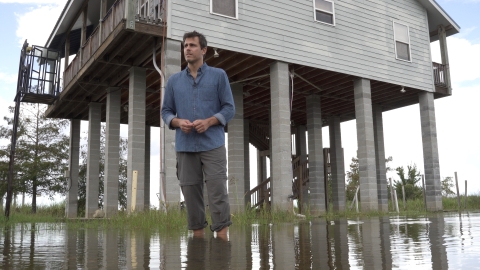Josh Landis is one of the first recipients of the inaugural ICFJ Alumni Reporting Grants. Learn about other grantees Verah Okeyo, Phil Cunningham, and Ruth Olurounbi and Kelechukwu Iruoma.

Josh Landis lived and worked in Antarctica from 1999 to 2001 as an editor at The Antarctic Sun, the only newspaper on the continent at that time. And while he was hardly the only person on the continent, it could often feel like that in a peaceful sort of way.
“Being able to sit on the ice, with penguins walking by and seeing killer whales spyhopping in the water, rising and falling right in front of me, stuck with me forever,” he says. “It gave me a personal appreciation for the vulnerability of these places which at first seems so impervious” to climate change.
After leaving Antarctica, Landis returned to his hometown of New York City where he worked in high-profile jobs for several years, writing for ABC News anchors and eventually becoming a CBS News national correspondent. Though he had reached a pinnacle professionally, his thoughts always drifted back to the Earth's southernmost continent. Four years ago, he helped found Nexus Media News, a nonprofit science, tech and environmental news service with a focus on climate change and supported by foundations.
Landis’ passion about climate change was among the reasons he was chosen by Microsoft News and the International Center for Journalists for an ICFJ Alumni Reporting Grant with a focus on data journalism, which included receiving data visualization training using Microsoft Power BI.
Landis and his team, in collaboration with the CityLab news organization, chose to investigate how climate change is influencing the U.S. real estate market. They drew upon research from the First Street Foundation, a nonprofit research group, which calculated real estate losses due to persistent flooding from Texas to Maine.
While other news reports covered the data by focusing on where the highest dollar amounts were lost, Landis, his team and First Street incorporated census data for a unique analysis. Using Power BI, they determined which areas lost the most real estate value relative to the average home price in the affected area. After crunching the numbers across thousands of ZIP codes, one of the highest “loss ratio” places was Bay St. Louis, Mississippi.
To then better visualize tables of numbers that could both capture the magnitude of coastal home loss and be helpful to property owners and renters who wanted to explore their own neighborhoods, they created an interactive map that pinpoints the extent to which flooding affected entire coastal regions and caused real estate losses. In doing so, they captured which areas suffered the worst losses as a share of their total real estate value.
In Bay St. Louis, a sliver of property bordering the waterfront is in high demand because houses are built to strict flood and storm standards and are eligible for government-subsidized insurance, Landis says. While those homes can command top dollar because of that, other houses a block or two away are not in such good stead.
“There are people who can’t afford to meet the FEMA standards, or they’re in homes that are grandfathered in and are getting flooded repeatedly,” as the impact of hurricanes intensify, Landis says. “Those people are taking increasing losses, because it’s getting worse, and there’s no real light at the end of the tunnel for them, and they just have to endure frequently high floods and the impact from that.”
And it’s about more than whether a house or road floods, making it hard to drive to work or get a child to school, Landis says. “It’s also about the larger impact to the community. And in some areas, that means it will be hard for people to sell – at any price.”
The team also used Power BI to report on another story about Buffalo, New York, considered by some to be a future “climate refuge city” from global warming. Long-term scientific predictions suggest the impacts of global warming will be less severe in Buffalo because of its cool weather and abundant access to fresh water from Lake Erie.
That may make Buffalo a desirable destination for those looking to escape climate change, Landis says, and city leaders need to make sure that housing and other services remain within reach for all economic groups, not just those who are wealthy. Among those moving to Buffalo are refugees from Hurricane Maria in Puerto Rico, he says.
The Buffalo story “is more about the need to think about city policy and developing affordable, equitable circumstances and policies so that everyone can have a place there,” Landis says.
He plans to update the Power BI map to include more of the U.S., with more stories to come resulting from future data.
He hopes the stories created by his team will help people understand how climate change affects very real and everyday aspects of life.
“It’s a fact of life and in our future,” he says. “And accepting that takes you to the next place, which is, what do we do?”
This article first appeared on Microsoft Stories here. Suzanne Choney is a writer with Microsoft Stories.